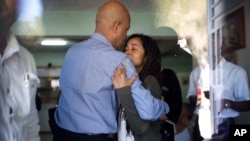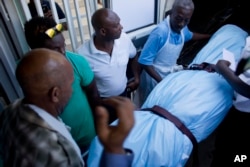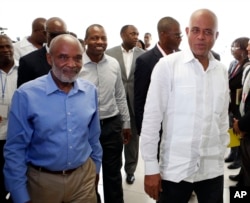As Haiti prepares for Saturday’s state funeral for former President Rene Garcia Préval, his death has taken on an air of intrigue.
When the 74-year-old died March 3 at a suburban Port-au-Prince hospital, the cause of death initially was cited as cardiac arrest. But, in the Caribbean country where voodoo still is practiced, rumors of foul play arose.
"Many people are talking about the possibility of Préval being poisoned,” District Attorney Danton Leger told a group of Haitian journalists in explaining why he’d opened an investigation into the two-time president’s death.
An autopsy was conducted this week at the request of Préval’s widow, Elisabeth, in the presence of Leger and his deputy. Its results could not confirm cardiac arrest, more commonly known as a heart attack, though it ruled out a brain hemorrhage or stroke.
On Thursday, Leger announced his office would seek additional testing on samples of Préval's heart and lung tissue as well as blood and urine. If his office could not find a lab in Haiti capable of performing sensitive tests to detect poison, the specimens would be sent to a foreign lab, he said. "We want the tests to be performed as quickly as possible" to tamp down suspicions.
Préval’s body was to lie in state Friday at the Muse du Pantheon National, within walking distance of the national palace from which he once governed. He led the country from 1996 to 2001 and again from 2006 to 2011. He was the country’s first president to win a democratic election, serve a full term and then peacefully hand over power to a successor.
The former president will be memorialized at a state funeral Saturday morning in the capital and later buried in his hometown of Marmelade in northern Haiti.
Preval was a soft-spoken agronomist and champion of the poor and had a reputation as an honest administrator.
He was prime minister under Haiti's first democratically elected president, President Jean-Bertrand Aristide, for a portion of 1991, until Aristide was deposed by a military coup.
Préval exemplified "compromise and efficiency" as a politician, his friend and former justice minister, Paul Denis, told VOA. "His flexibility was key to the relative success he enjoyed during his two terms in office. That’s why people say that he was a smart and subtle politician."
A defining moment of his second presidential term was the massive earthquake in January 2010 that killed more than 200,000 people and caused enormous damage to the impoverished nation. The president oversaw the beginning of efforts to rebuild his shattered country, but also faced criticism for a lack of leadership during the crisis.






